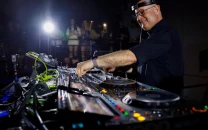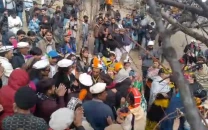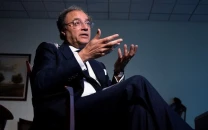Tees aur aik saal: Documenting and celebrating our cultural history
Tehrik-e-Niswan commemorates its 31 years.

Tees aur aik saal: Documenting and celebrating our cultural history
Tehrik-i-Niswan celebrated 31 years of existence by organising a three-day seminar from December 24 to December 26 at the Oxford University Press, Karachi. The international conference allowed participants from Pakistan, Bangladesh, India, the US and Germany to meet on one platform.
Dancer and teacher Mani Chao said he got the goose bumps while performing on stage. “An Indian newspaper editor complimented me on the colourful and joyful performance in a Bharata Natyam dance and I shivered with excitement,” he said exuberantly.
For others, it was an urgent event. “The cultural history of our country should be documented, revisited and celebrated for the vibrancy it has to offer and these performances are trying to do just that,” said theatre practitioner, classical dancer and founder of Tehrik-i-Niswan, Sheema Kermani.
Adorned in ghungrus, classical dancers took the stage to perform on Friday.
Shama Askari stormed the stage on Sunday in her peacock turquoise gharara, performing the role of a maulvi’s wife. “If a mard (man) can keep both his women happy, doosri shaadi karna sawab ka kaam hai,” claimed the maulvi, played by actor Saife Hasan. [If a man can keep both his women happy, then it’s a good deed for him to marry twice]. The skit underlined the relationship of the maulvi sahib and his wife, who did not support his desire to bring home a second wife just because she was plagued with a ‘najis beemari’ and could not have children.
Hasan said his role came easy to him because he observed the general attitude of men in Pakistani society. “I was made the villain, but did not feel like I was playing the part because this type of guy can be found every household,” he said.
Other performances too shed light on sensitive issues, such as a woman’s sexuality, which Kermani said “did not even exist” for our society.
Set designer for theatre, film and television and director and performer Stefani Oberhoff from Germany said she has worked with the organisation since 1998. She was present for a question-and-answer session on Sunday while Madeeha Gauhar, theatre practitioner and director of Ajoka Theatre, Lahore, was part of the 120-minute-panel discussion on Saturday.
The general consensus was that the conference had been much needed. “More people should come to the theatre,” said Saife Hasan, who has been a member for 14 years. The 20-year-old founder of Citylights Production, Hamza Bangash added some insight on theatre-going trends: “People watch plays for selfish reasons. Either they have been dragged by actors or come so they can have something to talk about at their kitty parties.”
Attendees, organisers, and even a 13-year-old boy in the audience not too familiar with the theatre scene in Pakistan agreed that there were a handful of enthusiasts who attend the theatre regularly and took it seriously.
“I do wish more people would step forward and take part but [regardless] our organisation will continue to perform and create a dialogue as we did in this conference,” Kermani promised.
The conference included discussions on different works including Kamran Asdar’s ‘Perverts and Puritans: How Manto and Sara Shagufta question the moral order,’ and the relationship between the performing arts and gender.
The conference also celebrated Urdu literature with Attiya Dawood closing Saturday’s ceremony with a poetry recitation and Zehra Nigah closing Sunday’s ceremony with her poetry recitations.
Published in The Express Tribune, December 27th, 2010.



















COMMENTS
Comments are moderated and generally will be posted if they are on-topic and not abusive.
For more information, please see our Comments FAQ